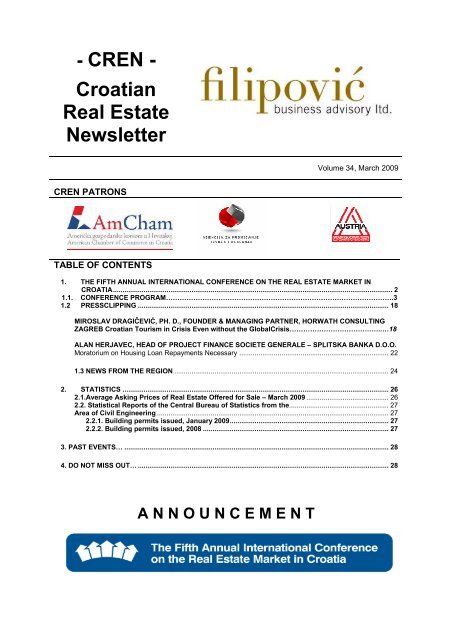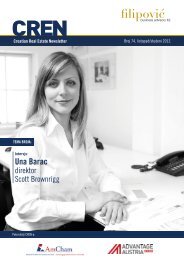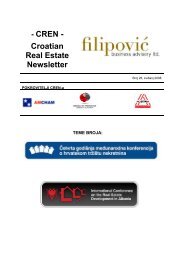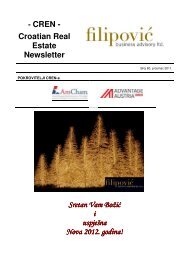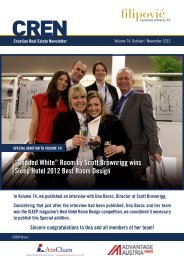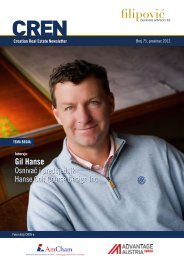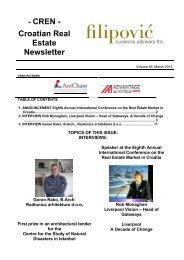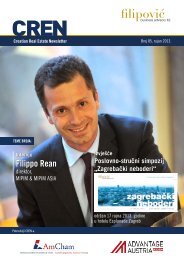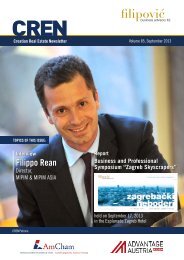- CREN - Croatian Real Estate Newsletter
- CREN - Croatian Real Estate Newsletter
- CREN - Croatian Real Estate Newsletter
You also want an ePaper? Increase the reach of your titles
YUMPU automatically turns print PDFs into web optimized ePapers that Google loves.
- <strong>CREN</strong> -<strong>Croatian</strong><strong>Real</strong> <strong>Estate</strong><strong>Newsletter</strong>Volume 34, March 2009<strong>CREN</strong> PATRONSTABLE OF CONTENTS1. THE FIFTH ANNUAL INTERNATIONAL CONFERENCE ON THE REAL ESTATE MARKET INCROATIA.................................................................................................................................................. 21.1. CONFERENCE PROGRAM……………………………………………………………………………………….31.2 PRESSCLIPPING ................................................................................................................................... 18MIROSLAV DRAGIČEVIĆ, PH. D., FOUNDER & MANAGING PARTNER, HORWATH CONSULTINGZAGREB <strong>Croatian</strong> Tourism in Crisis Even without the GlobalCrisis…………………………………..…18ALAN HERJAVEC, HEAD OF PROJECT FINANCE SOCIETE GENERALE – SPLITSKA BANKA D.O.O.Moratorium on Housing Loan Repayments Necessary .............................................................................. 221.3 NEWS FROM THE REGION ................................................................................................................ 242. STATISTICS ........................................................................................................................................... 262.1.Average Asking Prices of <strong>Real</strong> <strong>Estate</strong> Offered for Sale – March 2009 ........................................... 262.2. Statistical Reports of the Central Bureau of Statistics from the.................................................... 27Area of Civil Engineering ......................................................................................................................... 272.2.1. Building permits issued, January 2009................................................................................... 272.2.2. Building permits issued, 2008 ................................................................................................. 273. PAST EVENTS… .......................................................................................................................................... 284. DO NOT MISS OUT… ................................................................................................................................... 28A N N O U N C E M E N T
1. THE FIFTH ANNUAL INTERNATIONAL CONFERENCEON THE REAL ESTATE MARKET IN CROATIA<strong>CREN</strong> - <strong>Croatian</strong> <strong>Real</strong> <strong>Estate</strong> <strong>Newsletter</strong> / March 2009. 2 / 30
1.1. CONFERENCE PROGRAMMarch 30 & 31, 2009The Westin Hotel ZagrebMonday, March 30, 200908.00 – 09.00 WELCOME AND REGISTRATION OF PARTICIPANTSCrystal Ballroom / groundfloor09.00 – 10.00 CONFERENCE OPENINGModerator:Marija NoršićFilipović Business Advisory Ltd.KEY NOTE SPEAKERSVedran MimicaDirectorBerlage InstituteMarko Škreb, Ph. D.Chief EconomistPrivredna banka Zagreb d.d.10.00 – 10.30 COFFEE BREAK<strong>CREN</strong> - <strong>Croatian</strong> <strong>Real</strong> <strong>Estate</strong> <strong>Newsletter</strong> / March 2009. 3 / 30
10.30 – 11.30 1st SET OF LECTURESREAL ESTATE BUSINESS IN TOURISMTopics: • Defining the predominating real estate models in tourism;• Geographical spread of models and regional examples;• Global players in the real estate business;• Is the tourism related real estate business desirable in Croatia?• Are tourism resorts possible without the real estate?• Advantages and disadvantages of existing models applied to ourconditions;• Recent practices;• Key barriers in application of the real estate models;• Short and medium term perspectiveModerator:Miroslav Dragičević, Ph. D., Founder & Managing PartnerHorwath Consulting ZagrebPanel participants:Ivica Čačić, DirectorHotel Partner d.o.o. ZagrebKrešimir Lipovšćak, PartnerTPA Horwath d.o.o.Otmar Michaeler, CEOMichaeler & Partner & Falkensteiner GroupVeljko Ostojić, DirectorRivijera Poreč d.o.o.Ivana Šoljan, CEOJupiter Adria d.o.o.11.30 – 12.00 COFFEE BREAK<strong>CREN</strong> - <strong>Croatian</strong> <strong>Real</strong> <strong>Estate</strong> <strong>Newsletter</strong> / March 2009. 4 / 30
12.00 – 13.00 2nd SET OF LECTURESPROJECT PRESENTATIONSWEST GATEINTER IKEA CENTREModerator:Natalija VulićFilipović Business Advisory Ltd.SPEAKERSDenis ČupićDirectorRedserve d.o.o.Johanna Hult RentschDeputy Development ManagerAustria, Switzerland & South East EuropeInter IKEA Centre GroupPRESENTATIONWORLD GREEN BUILDING COUNCIL OF CROATIAMark Gero, ChairmanAmCham Environmental Committee13.00 – 14.30 LUNCHOPERA ROOMArtRoomEXHIBITIONAT FIRST GLANCE – ALLEGORY OF FACESDuring the Conference, at 17. floor of the Westin Zagreb Hotel in room Opera, there will be held anexhibition “At First Glance” – Allegory of Faces, at which students of the Academy of Fine Arts inZagreb will represent their artwork. Filipović Business Advisory Ltd. is the initiator, organizer andsponsor of the Exhibition. We are honored that the Academy of Fine Arts in Zagreb is the patron ofthe Exhibition. Exhibited work can be bought directly from the students.We are inviting you to visit the Exhibition, to enjoy the artwork of young authors and therefore givethem the support in their professional development.<strong>CREN</strong> - <strong>Croatian</strong> <strong>Real</strong> <strong>Estate</strong> <strong>Newsletter</strong> / March 2009. 5 / 30
Magnum HotelsCharlotte Ruhe, Head of the OfficeEBRD CroatiaMichael Widmann, Managing DirectorPKF hotelexperts GmbH2. Room PanoramaLEGISLATIVE FRAME FOR SPATIAL PLANNING OF SHOPPINGCENTERSTopics: • Legislative frame for spatial planning of shopping centers;• Procedures for environmental impact appraisals and getting thelocation permit for shopping centers;• Experience in process of planning, designing and gettinglicenses for commercial and entertainment center „Arenacentar“ in Zagreb;• Architectural vision of shopping centre development projectsModerator:Goranka Radović, Head of the SectorMinistry of Enviromental Protection, Physical Planning andConstruction, Sector for Developments Significant to theRepublic of CroatiaSpeakers:Tamara Stantić Brčić, Head ArchitectUPI-2M15.30 – 16.00 COFFEE BREAKLeo Penović, Project ManagerTrigranit Development Corporation16.00 – 17.00 4th SET OF LECTURES1. Crystal BallroomURBAN REVITALIZATIONTopics: • <strong>Real</strong>location of one-time industrial plants – reconstruction ofTorpedo hall into the business-trade fair centre;• <strong>Real</strong>location derelict parts of the town – Rujevica –residential development in the non-adequately used part of thetown;• Enhancing the camping zone into the zone of elite congress tourism– district of Preluk• City project in function of urban revitalization of Zagreb<strong>CREN</strong> - <strong>Croatian</strong> <strong>Real</strong> <strong>Estate</strong> <strong>Newsletter</strong> / March 2009. 7 / 30
Moderator:Ninoslav Dusper, M. A., DirectorUrban Planning Institute of Croatia ltd.Speakers:Irena Matković, Head of OfficeCity of Zagreb, Office for the Strategic Planning andDevelopmentSrđan Škunca, Head of DepartmentCity of Rijeka, Department of Urban Development,Environment and Asset Management2. Room PanoramaPUBLIC – PRIVATE PARTNERSHIPLEGAL FRAMETopics: • New Law on Public-Private Partnership and Laws on Concessions,Agency for Public-Private Partnership;• Regulations on new Law on Public-Private Partnership;• Contractual documentation on the old and new Law on Public-PrivatePartnershipModerator:Speakers:Saša Marenjak, Ph. D., Manager, PPP Knowledge Centre<strong>Croatian</strong> Institute for Bridge and Structural EngineeringVladimir Skendrović, Ph. D., Manager for CroatiaWorld BankKamilo Vrana, Managing DirectorAgency for Public – Private PartnershipBranko Vukmir, Ph. D., Advisor17.00 – 17.30 COFFEE BREAK<strong>CREN</strong> - <strong>Croatian</strong> <strong>Real</strong> <strong>Estate</strong> <strong>Newsletter</strong> / March 2009. 8 / 30
17.30 – 18.30 5th SET OF LECTURES1. Crystal BallroomLEGISLATIVE FRAME FOR SPATIAL PLANNING OF TOURISTZONES WITHIN THE PROTECTED COASTAL AREATopics: • Legislative obligations considering tourist zones planning;• Regulation distinction for tourist zone planning inside and outside of theurban settlements, and in the mixed settlements zone;• Obligations and planning levels from development to procedural spatialplans;• Process of making and producing Urban Development Plan/ DetailedUrban Plan for tourist zones;• Process of issuing permits and development of Punta Scala touristzone in ZadarModerator:Ana Mrak Taritaš, Head of the OfficeMinistry of Environmental Protection, Physical Planning andConstruction, Sector for Spatial PlanningSpeaker:Željko PredovanBlock-projekt d.o.o.2. Room PanoramaPUBLIC – PRIVATE PARTNERSHIPPRESENT EXPERIENCESTopics: • Structuring and financing Public-Private Partnership projects;• <strong>Croatian</strong> Public-Private Partnership practice experiences – PublicSector interest or not?• Case Study – Handball sports hall in SplitModerator:Speakers:Vladimir Skendrović, Ph. D., Manager for CroatiaWorld BankDaniel Lenardić, Director, Business Advisory ServicesKPMG Croatia d.o.o.Saša Marenjak, Ph. D., Manager, PPP Knowledge Centre<strong>Croatian</strong> Institute for Bridge and Structural Engineering19.00 – 24.00 GALA RECEPTION AT THE CROATIAN NATIONAL THEATER<strong>CREN</strong> - <strong>Croatian</strong> <strong>Real</strong> <strong>Estate</strong> <strong>Newsletter</strong> / March 2009. 9 / 30
Tuesday, March 31, 200909.00 – 09.30 WELCOME AND REGISTRATION OF PARTICIPANTSLectures are simultaneously held in two conference rooms:1) Crystal Ballroom / groundfloor2) Room Panorama / 17. floor09.00 - 10.00 1st SET OF LECTURES1. Crystal BallroomCITY OF ZAGREBTopics: • City of Zagreb-town integration;• Spatial and urban planning system;• City of Zagreb urban layout reconstruction for 21st century;• City urban consolidation model shown in example of München;• Railway line between Donji grad and TrnjeModerator: Slavko Dakić, M. A.Speakers:Višnja Bedenko, Assistant Head of the OfficeCity of Zagreb, Institute for Strategic Planning andDevelopmentJadranka Veselić – Bruvo, Head of DepartmentCity of Zagreb, Institute for Strategic Planning andDevelopmentAleksander Laslo, Assistant Head of the OfficeCity of Zagreb, Institute for Strategic Planning andDevelopmentAcademician Professor Velimir Neidhardt, Ph. D.University of Zagreb, the Faculty of Architecture<strong>CREN</strong> - <strong>Croatian</strong> <strong>Real</strong> <strong>Estate</strong> <strong>Newsletter</strong> / March 2009. 10 / 30
2. Room PanoramaREAL ESTATE FINANCINGTopics: • Short introduction on the topic of global and financial environment,with review to CEE region;• Global crisis impact on economy and finance sector of the Republicof Croatia;• Situation on the real estate finance market in the Republic ofCroatia;• Changes of the criteria within the banks;• Trends of banking sector’s assets scope related to real estatefinancing;• The development of banking industry in Republic of Croatia;• How did the banks meet the crisis?• Will it come to withdrawal of foreign owners assets (capital,deposits, dividends?);• What kind of future awaits us?• Development in the retail and office landscape in the past 6-12 months;• Future trends and consequently the new behaviour of banksand the playersModerator:Natalija Vulić, Head of Shopping and IndustrialFilipović Business Advisory Ltd.Speakers:Alan Herjavec, Head of Project FinanceSociete Generale – Splitska banka d.o.o.Vlaho Kojaković, Development DirectorTriGranit Development CorporationJochen W. Seibert , DirectorRedServe GmbHMag. Hanna Bomba – Wilhelmi, CEORegioplan Consulting GmbH10.00 – 10.30 COFFEE BREAK<strong>CREN</strong> - <strong>Croatian</strong> <strong>Real</strong> <strong>Estate</strong> <strong>Newsletter</strong> / March 2009. 11 / 30
10.30 - 11.30 2nd SET OF LECTURES1. Crystal BallroomHOUSINGRESIDENTIAL DEVELOPMENT IN CROATIATopics: • Present situation analysis;• Residential development in Croatia in the upcoming years;• Special review to the market crisis;• Global financial crisis impact on the real estate market inCroatia;• Possible recovery measuresModerator:Dubravko Ranilović, Partner, Kastel Nekretnine, Zagreb,President of <strong>Real</strong> <strong>Estate</strong> Association at the <strong>Croatian</strong> Chamberof CommerceSpeakers:Danijel Babić, Member of the Management BoardProfectus d.o.o.Ivan Stojević, DirectorPBZ nekretnine d.o.o.Josip Tica, Ph. D. Doc.Department of Macroeconomics and Economic Development,Faculty of Economics & Business at the University of Zagreb2. Room PanoramaARCHITECTURECROATIAN CONTEMPORARY ARCHITECTURE – EXPERIENCES,REALIZATIONS, PROJECTSTopics: • Discussion between reputable and expert architects aboutarchitects’ role in the arising situation of economic crisis andreduced real estate development project activities’ level;• What kind of impact will the economic crisis have on the quality ofarchitectural projects;• Comparison to similar periods in <strong>Croatian</strong> contemporaryarchitecture;• The role of the architects in the projects of commercial real estatedevelopment: tourism, office buildings, shopping centres, industryetc.<strong>CREN</strong> - <strong>Croatian</strong> <strong>Real</strong> <strong>Estate</strong> <strong>Newsletter</strong> / March 2009. 12 / 30
Moderator:Speakers:Petra Škevin, Member of the Management BoardFilipović Business Advisory Ltd.Otto Barić, DirectorArhitektura tholos projektiranje d.o.o.Academician Branko Kincl, ProfessorCivil Engineering Institute of CroatiaSaša Randić M. A., DirectorRandić-Turato d.o.o.Dario Travaš, Managing DirectorATP projektiranje Zagreb11.30 – 12.00 COFFEE BREAK12.00 - 13.00 3rd SET OF LECTURES1. Crystal BallroomLOGISTIC PARKSTopics: • Risk for developers in the process of building logistic parks inCroatia;• Agents’ challenge with brokerage in leasing of the logistic parks;• Development of logistic parks market in Croatia for the following2-3 years;• Distributors’ needs and demands;• New concepts of distribution;• Changes in the logistic parks' market in the past 5 yearsModerator:Speakers:Patrick Franolić, Managing DirectorSpiller Farmer d.o.o.Željko Čeović, Logistic ManagerOktal PharmaJovica Mandarić, Operations DirectorAWT GroupDario Markanovic, General ManagerIIG GroupIgor Šaravanja, Director Strategy and OrganizationALCAAndrew Yeoman, DirectorTower 151 Architects Zagreb d.o.o.<strong>CREN</strong> - <strong>Croatian</strong> <strong>Real</strong> <strong>Estate</strong> <strong>Newsletter</strong> / March 2009. 13 / 30
2. Room PanoramaOFFICE SPACECAN THE OFFICE MARKET WITHSTAND THE CRISIS?Topics: • Overview of the Zagreb market in a CEE context;• Will there be more supply in the coming 2 to 3 years;• How do developers plan to finance their projects;• Are existing office buildings being affected by the crisis;Is there a specific occupier sector or grade of space (A/B) which ismore affected?Moderator:Arn Willems, PartnerCB Richard EllisSpeakers:Wolfgang Binter, Project ManagerHypo Alpe-Adria-Immobilien AGIvana Božičević, DirectorLS PropertyTomislav Gregurić, Director Commercial ServicesKing SturgeŽarko Kovačić, DirectorIlirika Nekretnine d.o.o.Erik Mohorović, Managing DirectorVerdispar Croatia13.00 – 13.30 COFFEE BREAK<strong>CREN</strong> - <strong>Croatian</strong> <strong>Real</strong> <strong>Estate</strong> <strong>Newsletter</strong> / March 2009. 14 / 30
13.30 - 14.30 4th SET OF LECTURES1. Crystal BallroomRETAILHOW TO OVERCOME OBSTACLES OF FURTHER RETAILMARKET DEVELOPMENT IN CROATIA?Topics: • Expansion during the period of global crisis – is it at risk?• Emerging markets will recover among the first ones – is the<strong>Croatian</strong> market the emerging one?• What kind of strategy do the retail companies use to fight the arisingsituation – considering sale techniqes, in the aspect of expansion?• What role does the project size has considering interest of tenants,but also interest of consumers – is that „size“ really important?• The banks – initiator or brake for Retail market development inCroatia?• Larger cities highstreets still do not lose in value – demand stillexists!Moderator:Nenad Peris, Manager of Retail DepartmentColliers InternationalSpeaker:Alma Mekić Čerdić, Director <strong>Real</strong> <strong>Estate</strong> FinancingErste & Steiermärkische Bank d.d.Nataša Ivana Dorotić, Leasing DirectorTriGranit Development CorporationDarko Knez, CEOKonzum d.d.Branko Mihajlov, Business Manager Croatia & SloveniaInter IKEA Centre d.o.o.Leo Mršić, M. A., DirectorLantea Grupa d.d.<strong>CREN</strong> - <strong>Croatian</strong> <strong>Real</strong> <strong>Estate</strong> <strong>Newsletter</strong> / March 2009. 15 / 30
2. Room PanoramaCROATIAN REAL ESTATE LAWTHE ROLE OF THE STATE AND MUNICIPALITIES IN THE REALESTATE MARKETTopics:• Purchase of state owned properties;• Purchase of real estates from municipalities;• Forms of use of state owned land;• New legal framework for agricultural land;• New legal framework for golf courtsModerator: Tomislav Borić, Ph. D.Faculty of Law, GrazSpeakers:Melita Veršić-Marušić, LL.M, Attorney at LawVersic Law OfficeSanja Porobija, Name PartnerPorobija & Porobija Law Firm14.30 – 15.30 LUNCH<strong>CREN</strong> - <strong>Croatian</strong> <strong>Real</strong> <strong>Estate</strong> <strong>Newsletter</strong> / March 2009. 16 / 30
<strong>CREN</strong> - <strong>Croatian</strong> <strong>Real</strong> <strong>Estate</strong> <strong>Newsletter</strong> / March 2009. 17 / 30
1.2. PRESSCLIPPINGIn regard The Fifth Annual International Conference on the<strong>Real</strong> <strong>Estate</strong> Market in Croatia, Jutarnji list (No. 3857, YearXI) has published following interviews:Author: Boba BlaškovićMiroslav Dragičević, Ph. D.,Founder & Managing PartnerHorwath Consulting Zagreb<strong>Croatian</strong> Tourism in Crisis Evenwithout the Global CrisisMiroslav Dragičević, manager of Horwath Consulting, theleading consultancy company for investment in tourism, saysthat <strong>Croatian</strong> tourism has some trump cards, but it urgentlyneeds to become an all-year round businessA great deal is expected from this tourism season, and the forecasts predicting a 30percent decrease in the number of tourists visiting Croatia are certainly notencouraging. What the tourism season will really be like and how to encourageinvestments were the topics of our interview with Miroslav Dragičević, manager ofHorwath Consulting.<strong>CREN</strong> - <strong>Croatian</strong> <strong>Real</strong> <strong>Estate</strong> <strong>Newsletter</strong> / March 2009. 18 / 30
For start, we asked him to assess the current state of play in the tourismindustry?Due to the predominant model of transition and the still existing obstacles, <strong>Croatian</strong>tourism has not changed the seasonal business model inherited from the socialistperiod. In order to overcome this, significant investment is needed, with largeinternational players, who would invest in hotels and tourism infrastructure. These arethe reasons why hotel businesses are still below the average occupancy levels andaverage prices in competitive countries. The occupancy rate of hotels is less than 50percent, and average revenues per room amounting to approximately EUR 19,000does not satisfy their interests.What should be the orientation of <strong>Croatian</strong> tourism?<strong>Croatian</strong> tourism has to be oriented towards providing high quality for its guests, ithas to be able to offer more than the sun and the sea, and in order to achieve this, itneeds major investment in tourism infrastructure and management and marketingsoftware. Croatia should not opt for mass construction of tourism towns, such as inTurkey or Northern Africa, but it has to be smart in restructuring its inherited assets,and create new quality at existing locations. It has to focus on sophisticated guestsfrom Europe and the world, and it has to offer them a new quality of accommodation,and a stay with content, above all it has to provide an experience. Naturally, this isnot easy to achieve, nor is it possible to achieve it quickly, but Croatia has to makethis decision now, and start working towards it systematically, in order to catch upwith the leading tourism countries, such as Austria, France or Italy.For quite some time, you have been working on a strategic marketing plan for<strong>Croatian</strong> tourism for the next five years. What are the position and the vision of<strong>Croatian</strong>tourism?The vision from the marketing plan is to become a strong lifestyle destination for theMediterranean and Europe, and we still have time to do this, because we still havenot used up all our trump cards. In order to achieve this vision, it is necessary quicklyto create a smart business environment for tourism, make significant investments inraising the standard of accommodation facilities and create new tourisminfrastructure, such as golf courses, theme parks, events, wellness centres etc. Allthis, parallel to promoting domestic agricultural product brands and typical <strong>Croatian</strong>food and drinks, would become the cultural trade mark of Croatia as a destination.The sun, the sea and reasonable hotel accommodation areno longer sufficient. New attractions are necessary, one hasto be able to offer a new quality of accommodation, newcontents and experiences.<strong>CREN</strong> - <strong>Croatian</strong> <strong>Real</strong> <strong>Estate</strong> <strong>Newsletter</strong> / March 2009. 19 / 30
Where are the sources of greatest potential?We have approximately 15 destinations, which can become the basis for buildingvalues, which would make all-year tourism possible – from Dubrovnik to Umag.These are destinations, which already have the strength for global marketing anddistribution. There is no need to re-invent the wheel, but only to establish projectsoriented towards supporting this basic vision of all-year tourism within our maintourism clusters of Istria, Kvarner, Dalmatia and Dubrovnik. In order to reduce theinvestment risks for investors, these projects should certainly involve new businessdevelopment models and new models of tourism property management. It should beup to the market and investors to decide which tourism products should be developedbesides the sun and sea (golf, health, congress etc). The state, on the other hand,has to encourage these new investments through special subsidies.You are the consultant for Brijuni Riviera...This project is at a standstill due to the crisis, but also due to some unresolvedobstacles concerning land. It is difficult to say now when construction will begin, but itis certain that this project can be supported by the market, and it will surely come tolife some day.What is the role of the local community – to what extent are our cities andcounties ready for the public-private-partnership model?I have no faith in the public-private-partnership model in tourism. I do not believe thatour local communities are yet mature enough to take large steps forward in thetourism industry. The incentives have to come from abroad, but in a transparent way,and the developers/investors have to be able to prove that their projects are in thebest interest of the well-being of the local community. I believe that the crisis willdiscard most projects envisaged by local communities as unrealistic, not thoughtthroughor speculative. I believe that the time of realistic and reasonable thinkingabout our investments in tourism is yet to come.What would you describe as the crucial problem of <strong>Croatian</strong> tourism?If you do not allow renowned foreign investors to enter this sector, observing theinternational rules of the game in this industry, then it is clear what the crucialproblem of our tourism is. It is xenophobia and corruption, and everything elsefollows. If you cannot operate in tourism, as you can – for instance – in Austria, bothin terms of investment procedures and in terms of state support to tourismmanagement and marketing, then these are the reasons why we are still weak andinefficient in the use of our resources. In order to change tourism, Croatia has tochange first, and we hope that we are getting closer to these changes to ourcivilization, as we are progressing in our negotiations with the EU.<strong>CREN</strong> - <strong>Croatian</strong> <strong>Real</strong> <strong>Estate</strong> <strong>Newsletter</strong> / March 2009. 20 / 30
Which countries are our greatest competitors?Actually, when it comes to tourism, one chooses one’s competition, because it is upto us to decide the league in which we will play. If we want to become a lifestyledestination with high value for our guests, then our competition is Tuscany,Provence, Côte d’Azur, the Amalfi coast and Styria, but certainly not Turkey, Egypt,Tunisia or even Monte Negro.We should use the crisis as an impetus for changeIn view of the economic crisis, what do you believe this tourism season will belike and when could the market recover?I believe that there is too much talk about the crisis. I believe that <strong>Croatian</strong> tourism isin a crisis irrespective of the global crisis, because it has been developing randomlyover the past 15 years. It is important to realize that the market will recover, but it willnever be the same. Today, people travel for the product and the experience, and thiscan only be achieved through hard work and creativity in the tourism industry. If thisis what you are relying on, then it is easier to manage the crisis. However, if you arerelying on three months of sun and sea without your own direct marketing andwithout important alliances with global distribution, then you are very dependant onluck. And this is precisely where we are now. So, it can only be luck or a set ofcircumstances that can save us to some extent this year, and I anticipate about a 15percent drop in revenues. However, we should use the crisis as an incentive tochange our tourism business model, as soon as possible.As far as you know, how many projects are currently ‘on hold’ due to theeconomic crisis?At least 50 large and more than a 100 small projects are currently on hold. Thepotential of these projects is much larger if one considers the changes necessary inour tourism industry. It is, therefore, time for Croatia to think thoroughly about how toencourage smart and high-value oriented investments in tourism. This is no longerjust an issue of tourism; it is an issue of the response of this country to questions ofeconomic growth in the years to come. Croatia has to decide whether it wants astrong tourism industry supported by global management, technological andmarketing standards, or if it wants to go on utilizing its natural resources in a cheapway.<strong>CREN</strong> - <strong>Croatian</strong> <strong>Real</strong> <strong>Estate</strong> <strong>Newsletter</strong> / March 2009. 21 / 30
Author: Boba BlaškovićAlan Herjavec,Head of Project FinanceSociete Generale – Splitska bankad.o.o.Moratorium on Housing LoanRepayments NecessaryThe financial crisis has affected all property segments, and thetopic of our interview with Alan Herjavec, head of ProjectFinancing Department at Splitska banka, was the impact of thecrisis on the financing sector. Without much ado, we asked himthe question that has been a source of concern for most of ourreaders.Will there be a rise in interest rates on loans?In the short term, I do not expect interest rates on housing loans to rise. However,should the crisis continue, it is possible that interest rates will rise on the financialmarket by a maximum of 1 percentage point by the end of the year.What is the most favourable credit model in Croatia?The most favourable model for housing loans is the one that involves the use ofseveral bank products, connected to reduced interest rates and fees, or purchase ofapartments, being built through projects financed by the bank.Citizens claim that the banks have introduced stricter conditions for obtainingloans, so that currently it is much harder to obtain a loan than it was a yearago. Which conditions have been made stricter?The conditions for awarding loans to citizens, who are buying residential premises,have changed due to the increase in the currency exchange rates of the CHF andEURO, and due to changes in calculating credit worthiness, resulting fromamendments of the Enforcement Act, higher interest rates and abolishing loansindexed to the CHF.<strong>CREN</strong> - <strong>Croatian</strong> <strong>Real</strong> <strong>Estate</strong> <strong>Newsletter</strong> / March 2009. 22 / 30
Investors also claim that the banks have introduced stricter conditions forapproving loans.Both in Croatia and in the developed financial markets, the banks have significantlyraised the criteria for granting loans to developers and investors. The share ofinvestors’ self-financing of the total costs of the investment has increased from 10-30%, to 30-40%. Today, banks can no longer assume the risk of financingspeculative projects, and they demand that a certain percentage of flats is sold, orleased, before taking a loan.Are such stricter conditions an obstacle to implementing quality projects?No, stricter conditions are a way for the banks to adapt their business operations toconditions of enhanced risk, and they do not pose an obstacle to implementingquality projects. The problem is, however, that a certain number of banks are nolonger in a position to finance projects, even good-quality projects by renownedinvestors. Societe Generale - Splitska banka is one of the exceptions in this respect,it is a bank that is still able to finance new projects, due to its reasonable businesspolicies in the past, and its affiliation with a strong and healthy banking group.How can the banks mitigate the crisis?The most important thing is to continue providing loans to citizens who are buyingapartments. Also, it is important for banks to continue financing new, good qualityprojects, which will provide new liquidity and preserve jobs in the constructionbusiness. The property industry is a cyclical business, and both a standstill in creditactivity and an excessive supply of credit contribute to its cyclical character. If all newprojects were brought to a standstill, we could face a shortage of apartments inZagreb in a year. For the banks, this is a time to be patient and calm. This is not atime for dramatic moves and calls for apartment sell-off.What should the government do?The government should prevent an escalation of the crisis in the economy, andprevent an increase of unemployment, and a reduction in real salaries. If the numberof unemployed persons should increase significantly, or if real salaries decrease, thestate could provide guarantees for a moratorium on housing loan repayments, andthus extend the repayment period for those clients who are faced with difficulties dueto losing their job or a reduction in salary. In order to resolve the housing issue forsome categories of citizens, the government should also use the situation, in whichinvestors would be willing to relinquish their profit in favour of achieving betterliquidity and security. Nobody should expect the state to have additional expenses,but it could contribute by providing guarantees for a certain part of the housing loan,which would make it possible to buy apartments without own participation by thebuyers, and thus encourage the sale of apartments. This model could be anadditional argument for the government in its negotiations with the trade unions, andit could increase budgetary revenues from the VAT on apartments sold.<strong>CREN</strong> - <strong>Croatian</strong> <strong>Real</strong> <strong>Estate</strong> <strong>Newsletter</strong> / March 2009. 23 / 30
1.3 NEWS FROM THE REGIONIzvor: www.europe-re.comBack to basics: MIPIM Summit 2009 gathers top industry wise menFollowing in the footsteps of last year’s highlyacclaimed summit, <strong>Real</strong> <strong>Estate</strong> Publishers(REP) and MIPIM jointly organized theinvitation-only MIPIM Summit 2009. Withglobal real estate transactions down 60% in2008, the select panel of leading internationalasset managers and institutional investorsexamined the current impact of the globaldownturn and offered their insight into whatwe can expect in the future.Fashion House Development plans the first ever Russian outlet center (RU)FASHION HOUSE Development, successorof The Outlet Company, and a partnership ofGVA Grimley Outlet Services and Liebrecht &Wood, have completed the acquisition of theirfirst Outlet plot in Russia.Sedes Holding A.S invests in prime Istanbul office space (TR)One of the first real office investmenttransactions has just been realized in Istanbul.The deal consists of five office floors in YapiKredi Plaza, located in Istanbul's CBD. SedesHolding A.S. has purchased five floors fromYapi Kredi Koray REIT in Yapi Kredi Plaza CBlock, one of Istanbul's most well-knownoffice towers.<strong>CREN</strong> - <strong>Croatian</strong> <strong>Real</strong> <strong>Estate</strong> <strong>Newsletter</strong> / March 2009. 24 / 30
Hochtief Development introduces new residential project at Kavčí Hory (CZ)On an area of 30,000 m², between therecently completed office building of KavčíHory Office Park and the Central Park atPankrác, four residential buildings with 334flats and four non-residential spaces will bebuilt. The residential complex, designed by arenowned architectural office Aulík Fi'erArchitekti, will be built within walking distancefrom city public transportProLogis signs two lease agreements in Slovakia (SK)ProLogis (NYSE: PLD) announces that it hassigned new lease agreements forapproximately 8,000 m² of warehouse spacein building 5 in ProLogis Park Bratislava,Slovakia. ProLogis Park Bratislava comprisessix buildings totaling 182,600 m² of warehousespace.Multi Development and Tesco open Forum Liberec in Czech Republic (CZ/NL)On February 26, 2009 Forum Liberec in theCzech Republic opened to the public. The firstphase comprises a modern 10,000-m² TescoMY Liberec department store and 60 othershops as well as 2,800 m² of A-class officesand 14 rental apartments. The planned 350parking places in the newly refurbishedgarage were supplemented with an extra 500places on the roof of the Forum.<strong>CREN</strong> - <strong>Croatian</strong> <strong>Real</strong> <strong>Estate</strong> <strong>Newsletter</strong> / March 2009. 25 / 30
REDEVCO Turkey to complete its first two shopping center projects in Q3 2009(TR)REDEVCO Turkey is getting ready for theopening of its first two shopping centerdevelopments in the third quarter of 2009.Gordion Shopping Center in Ankara will openits doors at the end of August, and ErzurumShopping Center in Erzurum is to open at theend of September.2. STATISTICS2.1. Average Asking Prices of <strong>Real</strong> <strong>Estate</strong> Offeredfor Sale – March 2009average priceEUR/m²price rangeEUR/m²ZAGREBHousingApartments 2.147 969 - 6.000Houses 1.903 685 - 7.200Commercial spaceOffices 1.917 1.351 - 3.702Business premises 2.290 960 - 8.663Office blocks 1.407 615 - 2.460COASTHousingApartments 2.072 868 - 4.820Houses 1.920 450 - 11.000Commercial space 1.627 687 - 4.580Tourist facilities 2.922 750 - 9.537Average is calculated on the basis of the currently quoted prices on the Burza nekretnina d.o.o.(<strong>Real</strong> <strong>Estate</strong> Stock Market ltd.), which is available online: www.burza-nekretnina.com.<strong>CREN</strong> - <strong>Croatian</strong> <strong>Real</strong> <strong>Estate</strong> <strong>Newsletter</strong> / March 2009. 26 / 30
2.2. Statistical Reports of the Central Bureau of Statistics from theArea of Civil Engineering2.2.1. Building permits issued, January 2009In January 2009, there were 862building permits issued, which was by96.8% more than in January 2008.In January 2009:- by type of constructions, 86.5%out of the total number of permits wereissued on buildings and 13.5% on civilengineering works;- by type of construction works,81.0% of permits were issued on newconstructions and 19.0% onreconstructions.According to permits issued in January2009, it was expected for 1 134dwellings with the average floor area of90.6 m 2 to be built.Advice: Building permits issued, January 2009, Central bureau of statistics, Zagreb,2009.2.2.2. Building permits issued, 2008There were 12.281 building permitsissued in 2008, which was by 4.1%less than in 2007.The expected value of works for thebuilding permits issued in 2008amounted to 41 389 582 thousandkuna, which was by 23.5% more thanin 2007.According to the permits issued in2008, there were 24 585 dwellingsplanned to be built, which was by 1.2%less than in 2007.In 2008:- by type of construction, 88.7% outof the total number of permits wereissued on buildings, and 11.3% on civilengineering works- by type of works, 79.0% of permitswere issued on new constructions and21.0% on reconstructions.Notice: Building permits issued, 2008, Central Bureau of Statistics, Zagreb, 2009.<strong>CREN</strong> - <strong>Croatian</strong> <strong>Real</strong> <strong>Estate</strong> <strong>Newsletter</strong> / March 2009. 27 / 30
3. PAST EVENTS…Date Name Location WebFebruary 05, 2009CEE Retail <strong>Real</strong><strong>Estate</strong> Awards GalaWarsaw, Polandwww.europaproperty.comFebruary 24-25,2009CEE Investment 2009 Bucharest, Romania www.easteurolink.co.ukFebruary 26-27,2009 CEE <strong>Real</strong> <strong>Estate</strong> 2009 Prague, Czech Republic www.easteurolink.co.ukMarch 03, 2009The <strong>Real</strong> <strong>Estate</strong>Market inSoutheastern EuropeBelgrade, Serbiawww.emportal.co.yuMarch 10-13, 2009MIPIM Cannes, France www.mipim.com4. DO NOT MISS OUT…Date Name Location WebMarch 30-31,2009The Fifth AnnualInternational Conferenceon the <strong>Real</strong> <strong>Estate</strong> Marketin CroatiaZagreb, Croatiawww.filipovic-advisory.comMarch 31, 2009CEE Marketing Strategies Bucharest, Romania www.easteurolink.co.ukApril 07-08Energy Use Optimisationin BuildingsWarsaw, Polandwww.informedia-poland.comApril 08-10, 2009Mall Expo Moscow, Russia www.eng.mail-expo.ruApril 14-15, 20094th InternationalConference"Retailtainment inUkraine"Kiev, Ukrainewww.mall-expo.com<strong>CREN</strong> - <strong>Croatian</strong> <strong>Real</strong> <strong>Estate</strong> <strong>Newsletter</strong> / March 2009. 28 / 30
April 23, 2009SEE <strong>Real</strong> <strong>Estate</strong> AwardsGalaBucharest, Romaniawww.europaproperty.comMay 07, 200911 th Shopping Center-SymposiumVienna, Austriawww.regioplan.euMay 12, 2009Transport Logistic Munich, Germany www.messe-muenchen.deMay 13-14, 2009International "ELITEESTATE" ConferenceSaint-Petersburg,Russiawww.eliteforum.ruMay 14-17, 2009INTERNATIONAL REALESTATE FORUM"INFOREAL"Saint-Petersburg,Russiawww.realfor.ruMay 27, 2009Russia CIS Premier <strong>Real</strong><strong>Estate</strong> Awards CeremonyVienna, Austriawww.europaproperty.comJune 09-12, 2009EIRE Expo Milan, Italy www.italiarealestate.itJune 22-24, 2009REBEC Conference Belgrade, Serbia www.europaproperty.com<strong>CREN</strong> - <strong>Croatian</strong> <strong>Real</strong> <strong>Estate</strong> <strong>Newsletter</strong> / March 2009. 29 / 30
PUBLISHER:Filipović Business Advisory Ltd.Trg bana Josipa Jelačića 3/V10000 Zagreb – CroatiaTel: +385 1 481 69 69Fax:. +385 1 483 80 60e-mail: cren@filipovic-advisory.comIt is our wish that the <strong>Croatian</strong> <strong>Real</strong> <strong>Estate</strong> <strong>Newsletter</strong> / <strong>CREN</strong> be a source ofspeedy and quality information for all who are active in the real estate sector –developers, planners, contractors, mediation agencies etc. Please send yourcomments, proposals and opinions to cren@filipovic-advisory.com to help usimprove <strong>CREN</strong> and make it the leading medium on the <strong>Croatian</strong> real estatemarket.Editorial staff: Vladimir Filipović – editor-in-chief, Lana Maria Milić, Marija Noršić,Petra Škevin and Natalija Vulić.<strong>CREN</strong> - <strong>Croatian</strong> <strong>Real</strong> <strong>Estate</strong> <strong>Newsletter</strong> / March 2009. 30 / 30


